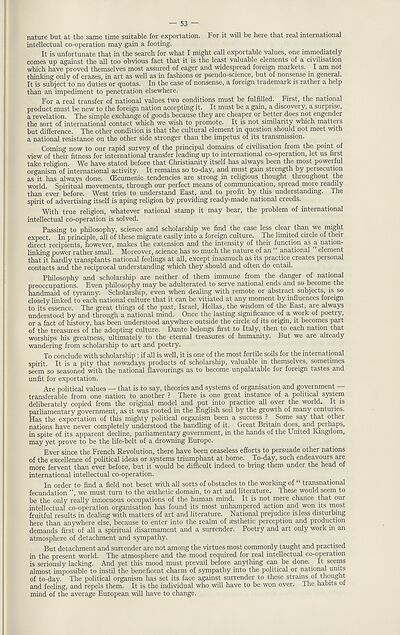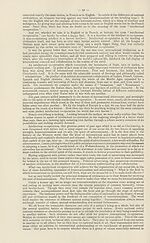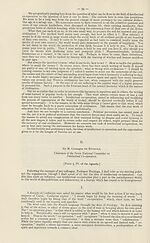International > Proceedings of the second General conference of national committees on intellectual co-operation, Paris, July 5th-9th, 1937
(55)
Download files
Complete book:
Individual page:
Thumbnail gallery: Grid view | List view

— 53 —
nature but at the same time suitable for exportation. For it will be here that real international
intellectual co-operation may gain a footing.
It is unfortunate that in the search for what I might call exportable values, one immediately
comes up against the all too obvious fact that it is the least valuable elements of a civilisation
which have proved themselves most assured of eager and widespread foreign markets. I am not
thinking only of crazes, in art as well as in fashions or pseudo-science, but of nonsense in general.
It is subject to no duties or quotas. In the case of nonsense, a foreign trademark is rather a help
than an impediment to penetration elsewhere.
For a real transfer of national values two conditions must be fulfilled. First, the national
product must be new to the foreign nation accepting it. It must be a gain, a discovery, a surprise,
a revelation. The simple exchange of goods because they are cheaper or better does not engender
the sort of international contact which we wish to promote. It is not similarity which matters
fouq difference. The other condition is that the cultural element in question should not meet with
a national resistance on the other side stronger than the impetus of its transmission.
Coming now to our rapid survey of the principal domains of civilisation from the point of
view of their fitness for international transfer leading up to international co-operation, let us first
take religion. We have stated before that Christianity itself has always been the most powerful
organism of international activity. It remains so to-day, and must gain strength by persecution
as it has always done. (Ecumenic tendencies are strong in religious thought throughout the
world. Spiritual movements, through our perfect means of communication, spread more readily
than ever before. West tries to understand East, and to profit by this understanding. The
spirit of advertising itself is aping religion by providing ready-made national creeds.
With true religion, whatever national stamp it may bear, the problem of international
intellectual co-operation is solved.
Passing to philosophy, science and scholarship we find the case less clear than we might
expect. In principle, all of these migrate easily into a foreign culture. The limited circle of their
direct recipients, however, makes the extension and the intensity of their function as a nation¬
linking power rather small. Moreover, science has so much the nature of an anational element
that it hardly transplants national feelings at all, except inasmuch as its practice creates personal
contacts and the reciprocal understanding which they should and often do entail.
Philosophy and scholarship are neither of them immune from the danger of national
preoccupations. Even philosophy may be adulterated to serve national ends and so become the
handmaid of tyranny. Scholarship, even when dealing with remote or abstract subjects, is so
closely linked to each national culture that it can be vitiated at any moment by influences foreign
to its essence. The great things of the past, Israel, Hellas, the wisdom of the East, are always
understood by and through a national mind. Once the lasting significance of a work of poetry,
or a fact of history, has been understood anywhere outside the circle of its origin, it becomes part
of the treasures of the adopting culture. Dante belongs first to Italy, then to each nation that
worships his greatness, ultimately to the eternal treasures of humanity. But we are already
wandering from scholarship to art and poetry.
To conclude with scholarship : if all is well, it is one of the most fertile soils for the international
spirit. It is a pity that nowadays products of scholarship, valuable in themselves, sometimes
seem so seasoned with the national flavourings as to become unpalatable for foreign tastes and
unfit for exportation.
Are political values — that is to say, theories and systems of organisation and government —
transferable from one nation to another ? There is one great instance of a political system
deliberately copied from the original model and put into practice all over the world. It is
parliamentary government, as it was rooted in the English soil by the growth of many centuries.
Has the exportation of this mighty political organism been a success ? Some say that other
nations have never completely understood the handling of it. Great Britain does, and perhaps,
in spite of its apparent decline, parliamentary government, in the hands of the United Kingdom,
may yet prove to be the life-belt of a drowning Europe.
Ever since the French Revolution, there have been ceaseless efforts to persuade other nations
of the excellence of political ideas or systems triumphant at home. To-day, such endeavours are
more fervent than ever before, but it would be difficult indeed to bring them under the head of
international intellectual co-operation.
In order to find a field not beset with all sorts of obstacles to the working of “ transnational
fecundation ”, we must turn to the aesthetic domain, to art and literature. These would seem to
be the only really innocuous occupations of the human mind. It is not mere chance that our
intellectual co-operation organisation has found its most unhampered action and won its most
fruitful results in dealing with matters of art and literature. National prejudice is less disturbing
here than anywhere else, because to enter into the realm of esthetic perception and production
demands first of all a spiritual disarmament and a surrender. Poetry and art only work in an
atmosphere of detachment and sympathy.
But detachment and surrender are not among the virtues most commonly taught and practised
in the present world. The atmosphere and the mood required for real intellectual co-operation
is seriously lacking. And yet this mood must prevail before anything can be done.. It seems
almost impossible to instil the beneficent charm of sympathy into the political or national units
of to-day. The political organism has set its face against surrender to these strains of tlioug t
and feeling, and repels them. It is the individual who will have to be won over. The habits oi
mind of the average European will have to change.
nature but at the same time suitable for exportation. For it will be here that real international
intellectual co-operation may gain a footing.
It is unfortunate that in the search for what I might call exportable values, one immediately
comes up against the all too obvious fact that it is the least valuable elements of a civilisation
which have proved themselves most assured of eager and widespread foreign markets. I am not
thinking only of crazes, in art as well as in fashions or pseudo-science, but of nonsense in general.
It is subject to no duties or quotas. In the case of nonsense, a foreign trademark is rather a help
than an impediment to penetration elsewhere.
For a real transfer of national values two conditions must be fulfilled. First, the national
product must be new to the foreign nation accepting it. It must be a gain, a discovery, a surprise,
a revelation. The simple exchange of goods because they are cheaper or better does not engender
the sort of international contact which we wish to promote. It is not similarity which matters
fouq difference. The other condition is that the cultural element in question should not meet with
a national resistance on the other side stronger than the impetus of its transmission.
Coming now to our rapid survey of the principal domains of civilisation from the point of
view of their fitness for international transfer leading up to international co-operation, let us first
take religion. We have stated before that Christianity itself has always been the most powerful
organism of international activity. It remains so to-day, and must gain strength by persecution
as it has always done. (Ecumenic tendencies are strong in religious thought throughout the
world. Spiritual movements, through our perfect means of communication, spread more readily
than ever before. West tries to understand East, and to profit by this understanding. The
spirit of advertising itself is aping religion by providing ready-made national creeds.
With true religion, whatever national stamp it may bear, the problem of international
intellectual co-operation is solved.
Passing to philosophy, science and scholarship we find the case less clear than we might
expect. In principle, all of these migrate easily into a foreign culture. The limited circle of their
direct recipients, however, makes the extension and the intensity of their function as a nation¬
linking power rather small. Moreover, science has so much the nature of an anational element
that it hardly transplants national feelings at all, except inasmuch as its practice creates personal
contacts and the reciprocal understanding which they should and often do entail.
Philosophy and scholarship are neither of them immune from the danger of national
preoccupations. Even philosophy may be adulterated to serve national ends and so become the
handmaid of tyranny. Scholarship, even when dealing with remote or abstract subjects, is so
closely linked to each national culture that it can be vitiated at any moment by influences foreign
to its essence. The great things of the past, Israel, Hellas, the wisdom of the East, are always
understood by and through a national mind. Once the lasting significance of a work of poetry,
or a fact of history, has been understood anywhere outside the circle of its origin, it becomes part
of the treasures of the adopting culture. Dante belongs first to Italy, then to each nation that
worships his greatness, ultimately to the eternal treasures of humanity. But we are already
wandering from scholarship to art and poetry.
To conclude with scholarship : if all is well, it is one of the most fertile soils for the international
spirit. It is a pity that nowadays products of scholarship, valuable in themselves, sometimes
seem so seasoned with the national flavourings as to become unpalatable for foreign tastes and
unfit for exportation.
Are political values — that is to say, theories and systems of organisation and government —
transferable from one nation to another ? There is one great instance of a political system
deliberately copied from the original model and put into practice all over the world. It is
parliamentary government, as it was rooted in the English soil by the growth of many centuries.
Has the exportation of this mighty political organism been a success ? Some say that other
nations have never completely understood the handling of it. Great Britain does, and perhaps,
in spite of its apparent decline, parliamentary government, in the hands of the United Kingdom,
may yet prove to be the life-belt of a drowning Europe.
Ever since the French Revolution, there have been ceaseless efforts to persuade other nations
of the excellence of political ideas or systems triumphant at home. To-day, such endeavours are
more fervent than ever before, but it would be difficult indeed to bring them under the head of
international intellectual co-operation.
In order to find a field not beset with all sorts of obstacles to the working of “ transnational
fecundation ”, we must turn to the aesthetic domain, to art and literature. These would seem to
be the only really innocuous occupations of the human mind. It is not mere chance that our
intellectual co-operation organisation has found its most unhampered action and won its most
fruitful results in dealing with matters of art and literature. National prejudice is less disturbing
here than anywhere else, because to enter into the realm of esthetic perception and production
demands first of all a spiritual disarmament and a surrender. Poetry and art only work in an
atmosphere of detachment and sympathy.
But detachment and surrender are not among the virtues most commonly taught and practised
in the present world. The atmosphere and the mood required for real intellectual co-operation
is seriously lacking. And yet this mood must prevail before anything can be done.. It seems
almost impossible to instil the beneficent charm of sympathy into the political or national units
of to-day. The political organism has set its face against surrender to these strains of tlioug t
and feeling, and repels them. It is the individual who will have to be won over. The habits oi
mind of the average European will have to change.
Set display mode to:
![]() Universal Viewer |
Universal Viewer | ![]() Mirador |
Large image | Transcription
Mirador |
Large image | Transcription
Images and transcriptions on this page, including medium image downloads, may be used under the Creative Commons Attribution 4.0 International Licence unless otherwise stated. ![]()
| League of Nations > International > Proceedings of the second General conference of national committees on intellectual co-operation, Paris, July 5th-9th, 1937 > (55) |
|---|
| Permanent URL | https://digital.nls.uk/195217890 |
|---|
| Shelfmark | LN.XII |
|---|
| Description | Over 1,200 documents from the non-political organs of the League of Nations that dealt with health, disarmament, economic and financial matters for the duration of the League (1919-1945). Also online are statistical bulletins, essential facts, and an overview of the League by the first Secretary General, Sir Eric Drummond. These items are part of the Official Publications collection at the National Library of Scotland. |
|---|---|
| Additional NLS resources: |
|

